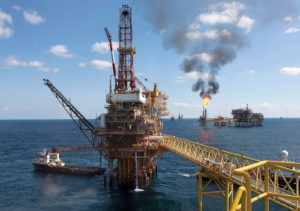 February 11, 2020//-The U.S. became a net oil exporter in recent months, having exported 772,000 bpd on a net basis in November 2019.However, most regions outside of the Gulf Coast are still large net importers.
February 11, 2020//-The U.S. became a net oil exporter in recent months, having exported 772,000 bpd on a net basis in November 2019.However, most regions outside of the Gulf Coast are still large net importers.
Excluding petroleum products, such as gasoline and diesel, the U.S. as a whole is still a large crude oil importer, having imported 5.8 mb/d of oil in November and only exporting 3 mb/d.
Market Movers
– Diamond Offshore Drilling (NYSE: DO) fell nearly 10 percent, dropping to all-time lows after the company’s CFO said it would probably be cash flow negative this year.
– Four LNG terminals in Texas received approvals from the U.S. Department of Energy, including Exelon’s (NASDAQ: EXC) proposed Annova LNG, NextDecade’s (NASDAQ: NEXT) Rio Grande LNG, Texas LNG and an expansion project at Cheniere Energy’s (NYSE: LNG) Corpus Christi LNG.
– Oceaneering International (NYSE: OII) jumped 5 percent on Tuesday on news that the company was awarded a contract from BP (NYSE: BP) for an offshore project in Angola.
Tuesday February 11, 2020
WTI fell below $50 per barrel on Monday, before bouncing back during midday trading on Tuesday. The hesitation from OPEC+ helped explain some of the decline, but the world continues to watch China for the latest on the coronavirus, where the death toll surpassed 1,000.
OPEC recommends cuts, but nothing confirmed. OPEC’s JTC recommended 600,000 bpd in cuts and an extension of the deal through the end of 2020.
Russia has hesitated on supporting the proposal and an emergency meeting in February now looks unlikely. The reluctance or hesitation from Moscow helped push prices down on Monday, although many analysts still see a deal taking place in March.
China cuts petrochemical operations. China’s private chemical and refining giant Hengli Petrochemical slashed operations by 90 percent due to the coronavirus, according to Reuters. It also reduced oil refining by 400,000 bpd. PetroChina cut refinery runs by 320,000 bpd as well.
Oil stored at sea. Vitol, Royal Dutch Shell (NYSE: RDS.A) and Litasco SA are making moves to hire oil tankers in order to store oil at sea, amid a brewing global glut of supply.
The flip of the futures curve into a contango situation provides financial incentives to store oil and sell at a later date.
Natural gas falls again. U.S. natural gas prices fell below $1.80/MMBtu on Monday, dragging down a broad range of gas-focused shale drillers. Gas prices are at a four-year low.
Natural-gas prices took “heavy losses to start the week…as mild weather outlooks continue to pressure prices lower,” said Christin Redmond, commodity analyst at Schneider Electric. But the warm weather is a global phenomenon. Mild temperatures probably hit oil demand by about 800,000 bpd in January, according to Gary Ross, founder of PIRA Energy.
Brazil oil workers strike continues. Petrobras (NYS: PBR) could hire emergency workers as a workers strike stretches into its 10th day.
BP to increase production at Shah Deniz. BP (NYSE: BP) said it would ramp up production at its Shah Deniz gas field in Azerbaijan. The company’s Azeri-Chirag-Guneshli (ACG) oil field lost production last year, and BP will work to maintain output.
Pennsylvania shale gas permits collapse. As prices fall off a cliff, drilling activity in Pennsylvania’s shale plays plunged 74 percent in January, compared to a year earlier. EQT (NYSE: EQT), the largest gas producer in the U.S., cut activity by more than 80 percent, as did Range Resources (NYSE: RRC).
Peak shale could support offshore boom. Signs of U.S. shale reaching a peak continue to mount, and it could push more companies to shift their sights offshore.
Trans Mountain costs soar. The estimated cost of the Trans Mountain Expansion pipeline soared from C$7.4 billion to $12.6 billion, due to higher labor and materials costs.
Trudeau considers major oil sands project. The Canadian government must make a decision on whether or not to approve a major oil sands project proposed by Teck Resources (TSE: TECK.A).
Reuters reports that if the government of Prime Minister Justin Trudeau rejects the project, he would likely consider an aid package for Alberta as compensation. Alberta’s Premier Jason Kenney warned of “devastating” economic consequences for the province if Trudeau rejects the project.
10 refiners emit dangerous levels of benzene. Ten U.S. oil refineries released cancer-causing benzene levels above federal limits last year, according to a report by the Environmental Integrity Project. Six of the refineries are in Texas.
Chevron adds production in Venezuela. Chevron (NYSE: CVX) has increased production in Venezuela, and President Nicolas Maduro has flirted with loosening control over the sector in order to attract foreign investment.
Maduro’s “likely goal is to make it so attractive, companies start to lobby harder in the U.S.,” Raul Gallegos, director at Control Risks, told Bloomberg.
Saudi Arabia and Kuwait to restart Neutral Zone. Saudi Arabia said on Monday that it was ready to restart some production at the Neutral Zone oil fields with Kuwait. The fields have a capacity of 500,000 bpd but have been idled for several years.
Chevron pushes back on Jim Cramer. Chevron (NYSE: CVX) CEO Michael Wirth said that Big Oil is not like Big Tobacco, pushing back against recent comments from CNBC’s Jim Cramer. The industry is on the defensive as investors bolt.
By Tom Kool, News Editor, Oilprice.com






